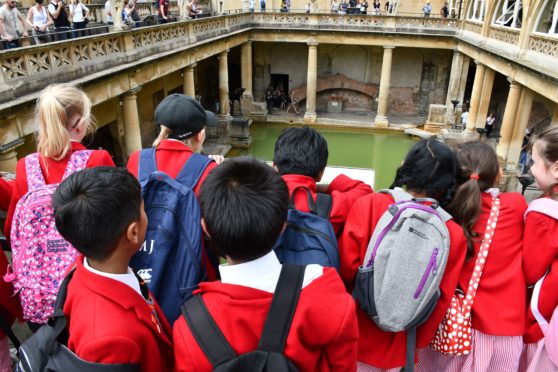Fundamentally, Brexit is not about meaningful votes, legal chicanery and the ego of politicians who want an amendment named after them.
It’s about something much bigger. So big that it’s easier to focus on the day-to-day soap opera than think about the defining issues.
It was intriguing sharing a stage a few weeks ago with a journalist, a civil servant and an academic who all brought different expertise and experience to the conversation. Yet a common theme emerged from their contributions: Brexit is about who we are. And until we can agree an answer, a satisfactory resolution will remain out of reach.
Are we a global power driven by trade and a buccaneering attitude? Are we a middle ranking nation trying to make the best of what we’ve got? Are we somehow special?
I’ve been pondering those questions since.
And a toga party provided the answer.
Toga parties may have gone the way of all the other indulgences that were open to students when they were given free money by the government like drinking, casual sex and forming prog rock bands.
But on a half term break in the spa city of Bath I visited the Roman baths and a guide explained that in the 1960s they used to hold toga parties there. The youth would hire in a jazz band and splash about just as the Romans had centuries previously. More recently, as a schoolgirl she said her entire class had an outing to the historic site which included taking a dip.
And yet here we were looking at the water that bubbles up warm after hundreds of years beneath the soil and we were confronted by a sign warning not to touch it.
On the way round the excellent exhibition it was explained that the site had been altered and updated through history. The Romans rejigged the layout when fun sponge emperor Hadrian banned men and women from bathing together. In the early modern period it was designed to accommodate pilgrims looking to cure their ills. And the Victorians added some naff statues. And what did the latest generation do? Rope it off. Cast it in aspic.
Why does that matter? Because it turns history into something that is viewed, not something that is lived.
It becomes a narrative imbibed at one remove, like the latest Marvel movie or a Star Wars blockbuster. Stories have clear cut goodies and baddies. History has nuance.
We’ve become a nation that fetishises our history but does not understand it. (And if you think this is only an English condition then consider the lyrics to Flower of Scotland.)
Look at the Brexiteers who insist our future lies in global trade. That may be true. But Europe is on the globe. The tribes that inhabited Somerset were trading across the Channel long before the Romans showed up. Because it’s nearby. Sometimes geography trumps all else. But we need history to see that.
For example, we may do a trade deal with Australia. We won’t ever do as much trade with Australia as we do with Europe. Because, to misquote Father Ted explaining perspective to his simpleton sidekick, Australia is both small (in terms of population) AND far away.
Courtesy of cultural exports like Neighbours and Kylie Minogue, Australia feels close. It’s not. It’s a complex nation that has grown up and grown away from the UK for over 200 years and is now firmly anchored in Asia economically. It has a history of its own.
Too many people currently driving policy see India as a ripe market just as traders did 300 years ago. But while they explain that Brexit is about more than economics they expect Indians to overlook the way their identity was abused in the name of Empire.
Detaching ourselves from our history also leads to the conclusion that we’re a special generation. On the way home from Bath I drove past Stonehenge, apparently able to withstand all that millions of tourists and millennia of British weather could throw at it. Now out of bounds. Because the current crop of tourists are that much more destructive than anyone else in all of human history? Visitors in years gone by armed with a polaroid camera and a Thermos were harmless but an iPhone and a bamboo keep-cup could knock over a stone age monolith?
And the thing about history is that it’s happened and it can’t be changed. The fantasy of British imperial kindness is fine until it runs up against reality.
Heaven help the negotiators who arrive in New Delhi having watched a box set of The Jewel in the Crown on the plane over as research. The sort of people who admire Boadicea for resisting the Romans but know nothing of the Asante repeatedly fending off British forces in 19th century Ghana.
Those without an anchor in the past become unhinged.
Among the sound and fury of recent fast moving events in parliament many of our politicians clearly feel the hand of history on their shoulder. Too many regard it as a pat on the back rather than the grip of an adult stepping in to prevent a child doing any more damage.
History holds the key to answering the fundamentals of Brexit. But not in the way many debating in the Commons this week might try to present it.
If history is to unlock our future we must engage with it rather than just tart it up, fence it off and charge fifty quid for a family ticket.
James Millar is a political commentator and author and a former Westminster correspondent for The Sunday Post











